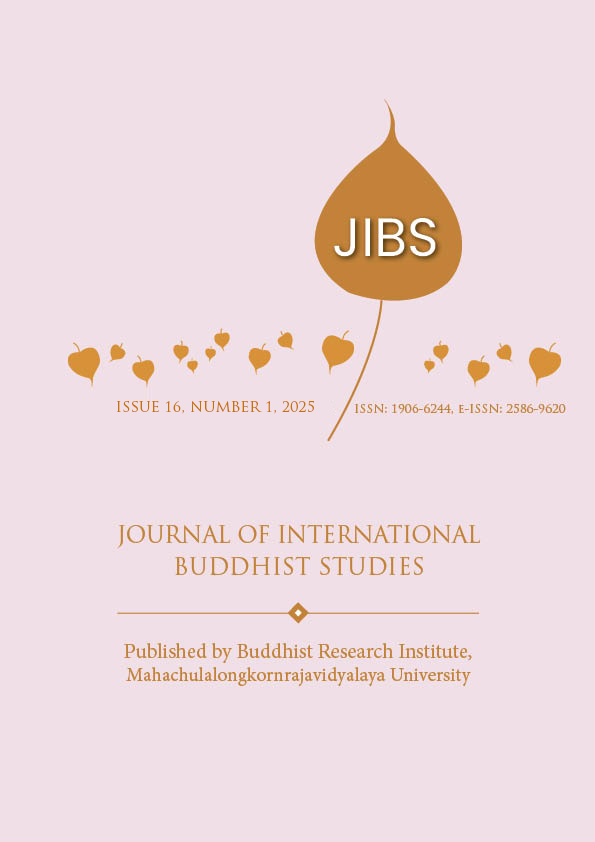Karma and Causation in Theravāda Buddhism: Rethinking Determinism and External Phenomena
DOI:
https://doi.org/10.65680/jibs.6178Keywords:
causation, conditionality, determinism, karma, TheravādaAbstract
This paper reexamines the relationship between karma and causation in Theravāda Buddhism, with a focus on how karma causes external events attributed to agents. It argues against the deterministic notion that karma directly determines external phenomena, suggesting instead that external phenomena serve as necessary and sufficient conditions for the arising of karmic results. The causal relationship between the arising of contact with external phenomena and the arising of karmic results operates bi-directionally. Narratives that link present experiences to past lives should not be interpreted as implying that the past deterministically causes present events. Rather, they suggest that a moral agent’s feelings arise through present contact with conditions, regardless of the specific external phenomena involved. Drawing from Pāli Sutta-s, Abhidhammattha Sangaha, and Western perspectives on causation, this paper explores both the ontological and epistemological dimensions of karma. It highlights the phenomena of consciousness and emphasizes the roles of cetanā (intention) and vedanā (feeling) as central to the experience and understanding of karma. The study also critiques deterministic interpretations found in popular Thai Buddhism, where karma is often viewed as a fixed explanatory framework for misfortune. Instead, it recommends a naturalistic and experiential approach that emphasizes present awareness and moral responsibility.
References
Bodhi, Bhikkhu, ed. A Comprehensive Manual of Abhidhamma: The Abhidhammattha Sangaha of Ācariya Anuruddha. Translated by Mahāthera Nārada. Kandy: Buddhist Publication Society, 1999.
Buddhadāsa, Bhikkhu. Idappaccayatā: The Buddhist Law of Nature. Commonly Misunderstood Buddhist Principles Series No. 1. Buddhadāsa Foundation and Buddhadāsa Indapañño Archives, February 2015. Accessed June 18, 2021. https://www.suanmokkh.org/books/18.
Cassaniti, Julia. Living Buddhism: Mind, Self, and Emotion in a Thai Community. Ithaca, NY: Cornell University Press, 2015.
Datta, D. M. The Six Ways of Knowing: A Critical Study of the Advaita Theory of Knowledge. Delhi: Motilal Banarsidass, 2017. Originally published 1932.
Deutsch, Eliot S. “Karma as a ‘Convenient Fiction’ in the Advaita Vedānta.” Philosophy East and West 15, no. 1 (1965): 3–12. https://www.jstor.org/stable/1397404.
Engel, Jaruwan S., and David M. Engel. Tort, Custom, and Karma: Globalization and Legal Consciousness in Thailand. Stanford, CA: Stanford University Press, 2010.
Francis, H. T., and R. A. Neil. The Jātaka, or Stories of the Buddha’s Former Births. Vol. 3. Edited by E. B. Cowell. Cambridge: Cambridge University Press, 1897. Accessed via SuttaCentral. https://suttacentral.net/ja353/en/francis-neil.
Jayatilleke, K. N. Early Buddhist Theory of Knowledge. London and New York: Routledge Taylor & Francis Group, 2008. Originally published 1963.
Kalupahana, David J. Causality: The Central Philosophy of Buddhism. Honolulu: University Press of Hawaii, 1975.
Karunadasa, Y. The Theravāda Abhidhamma: Inquiry into the Nature of Conditioned Reality. Massachusetts: Wisdom Publications, 2013.
Kaufman, Whitley. “Karma, Rebirth, and the Problem of Evil.” Philosophy East and West 55 (2005): 15-31.
_____.“Karma, Rebirth, and the Problem of Evil: A Reply to Critics.” Philosophy East and West 57 (2007): 556-560.
Nārada Thera. A Manual of Abhidhamma: Revised Edition. Kolkata: Mahabodhi, 2013.
Payutto, P. A. Buddhadhamma: The Laws of Nature and Their Benefits to Life. Edited by The Buddhadhamma Foundation. Translated by Robin Philip Moore. Bangkok: The Buddhadhamma Foundation, 2017.
Papineau, David. “Naturalism.” Edited by Edward N. Zalta. Stanford Encyclopedia of Philosophy(Summer 2021 Edition). Metaphysics Research Lab, Stanford University, 2021. https://plato.stanford.edu/archives/sum2021/entries/naturalism/.
Paṭhamkyaw Ashin Thiṭṭila. “Ñāṇavibhaṁga: Analysis of Knowledge (VB 16).” SuttaCentral. Accessed January 22, 2024. https://suttacentral.net/vb16/en/thittila?lang=en&reference=none&highlight=false.
Potter, Karl H. “The Naturalistic Principle of Karma.” Philosophy East and West 14 (1964): 39-49.
Reasoner, Paul. “Reincarnation and Karma.” In A Companion to Philosophy of Religion, edited by Charles Taliaferro, Paul Draper, and Philip L. Quinn, 639-647. West Sussex: Wiley-Blackwell, 2010.
Reichenbach, Bruce R. “Karma, Causation, and Divine Intervention.” Philosophy East and West 39 (1989): 135-149. https://doi.org/10.2307/1399374.
_____. “The Law of Karma and the Principle of Causation.” Philosophy East and West 38 (1998): 399-410. https://doi.org/10.2307/1399118.
_____. The Law of Karma: A Philosophical Study. Edited by John Hick. Hampshire and London: Macmillan Academic and Professional Ltd, 1990.
Ronkin, Noa. Early Buddhist Metaphysics: The Making of a Philosophical Tradition. London and New York: RoutledgeCurzon, 2005.
Schaffer, Jonathan. “The Metaphysics of Causation.” Edited by Edward N. Zalta. Stanford Encyclopedia of Philosophy (Summer 2016 Edition). Accessed May 1, 2020. https://plato.stanford.edu/entries/causation-metaphysics/.
Sujato, Bhikkhu. Naḷakapāna Sutta (MN 68). Majjhima Nikāya. SuttaCentral. Accessed July 12, 2022. https://suttacentral.net/mn68/en/sujato.
_____. Dasuttara Sutta (DN 34). Dīgha Nikāya. SuttaCentral. Accessed July 12, 2022. https://suttacentral.net/dn34/en/sujato.
_____. Mahāsatipaṭṭhāna Sutta (DN 22). Dīgha Nikāya. SuttaCentral. Accessed January 1, 2024. https://suttacentral.net/dn22/en/sujato.
_____. Nibbedhika Sutta (AN 6.63). Aṅguttara Nikāya. SuttaCentral. Accessed July 12, 2022. https://suttacentral.net/an6.63/en/sujato.
_____. Vitthārasutta (AN 4.233). Aṅguttara Nikāya. SuttaCentral. Accessed January 1, 2024. https://suttacentral.net/an4.233/en/sujato.
Terwiel, Bernard J. Monks and Magic: Revisiting a Classic Study of Religious Ceremonies in Thailand. First published 1975. Thailand: NIAS Press, 2012.
Thanissaro, Bhikkhu. “Dhatu-vibhanga Sutta: An Analysis of the Properties (MN 140).” Dhamma Talks. Accessed January 1, 2024. https://www.dhammatalks.org/suttas/MN/MN140.html.
_____. Mahākammavibhaṅga Sutta (MN 136). Majjhima Nikāya. SuttaCentral. July 3. Accessed January 1, 2024. https://suttacentral.net/mn136/en/thanissaro.
_____. “Kalama Sutta: To the Kalamas” (AN 3.65). Insight (BCBS Edition). November 30, 2013. Accessed January 1, 2024. http://www.accesstoinsight.org/tipitaka/an/an03/an03.065.than.html.
_____. “Paccaya Sutta: Requisite Conditions (SN 12.20).” Edited by Access to Insight (BCBS Edition). November 30, 2013. Accessed January 1, 2024. http://www.accesstoinsight.org/tipitaka/sn/sn12/sn12.020.than.html.
_____. “Sivaka Sutta: To Sivaka” (SN 36.21). Access to Insight (BCBS Edition). November 30, 2013. Accessed January 1, 2024. https://accesstoinsight.org/tipitaka/sn/sn36/sn36.021.than.html.
Walters, Jonathan S. “Pubbakammapilotikabuddhaapadāna.” SuttaCentral. Accessed January 1, 2024. https://suttacentral.net/tha-ap392/en/walters?lang=en&reference=none&highlight=false.
Westerhoff, Jan. “Buddhism without Reincarnation? Examining the Prospects of a ‘Naturalized’ Buddhism.” In A Mirror Is for Reflection: Understanding Buddhist Ethics, edited by Jake F. Davis, 146–65. New York: Oxford University Press, 2017.
Downloads
Published
How to Cite
Issue
Section
License
Copyright (c) 2025 Journal of International Buddhist Studies

This work is licensed under a Creative Commons Attribution 4.0 International License.











